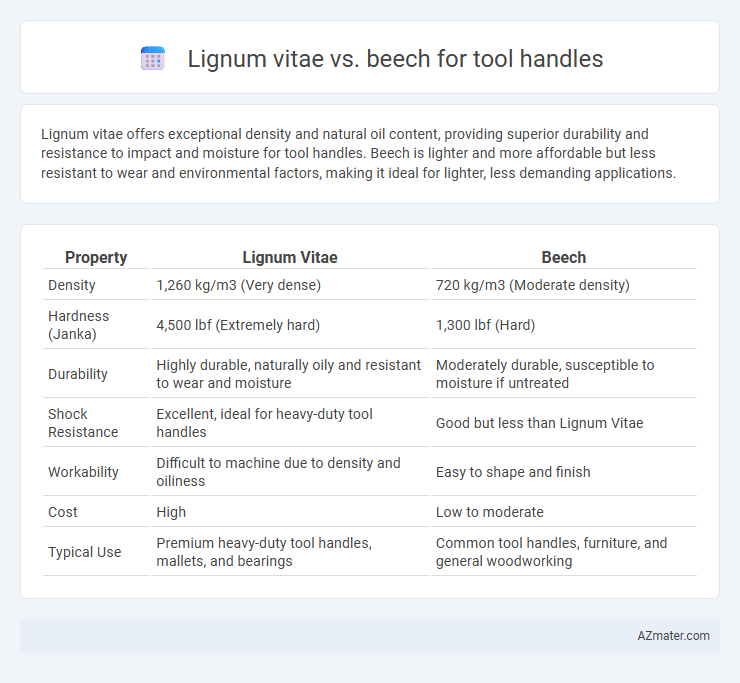Lignum vitae offers exceptional density and natural oil content, providing superior durability and resistance to impact and moisture for tool handles. Beech is lighter and more affordable but less resistant to wear and environmental factors, making it ideal for lighter, less demanding applications.
Table of Comparison
| Property | Lignum Vitae | Beech |
|---|---|---|
| Density | 1,260 kg/m3 (Very dense) | 720 kg/m3 (Moderate density) |
| Hardness (Janka) | 4,500 lbf (Extremely hard) | 1,300 lbf (Hard) |
| Durability | Highly durable, naturally oily and resistant to wear and moisture | Moderately durable, susceptible to moisture if untreated |
| Shock Resistance | Excellent, ideal for heavy-duty tool handles | Good but less than Lignum Vitae |
| Workability | Difficult to machine due to density and oiliness | Easy to shape and finish |
| Cost | High | Low to moderate |
| Typical Use | Premium heavy-duty tool handles, mallets, and bearings | Common tool handles, furniture, and general woodworking |
Introduction to Lignum Vitae and Beech Wood
Lignum vitae, known for its exceptional density and natural oils, offers superior durability and resistance to wear, making it an ideal choice for heavy-duty tool handles. Beech wood, characterized by its fine grain and moderate hardness, provides a comfortable grip and good shock absorption, suitable for everyday hand tools. Both woods are valued in tool making, but Lignum vitae excels in longevity and resilience, whereas Beech balances strength with ease of handling.
Physical Properties Comparison
Lignum vitae exhibits exceptional density (approximately 1.23 g/cm3) and natural oils, providing superior hardness (Janka hardness of around 4,500 lbf) and excellent shock resistance compared to Beech, which has a density near 0.71 g/cm3 and a Janka hardness of about 1,300 lbf. The high tensile strength (up to 12,500 psi) and natural self-lubricating properties of Lignum vitae make it highly resistant to wear and water damage, ideal for heavy-duty tool handles. In contrast, Beech's moderate strength and lower oil content make it easier to shape but less durable under repeated impact and moisture exposure.
Strength and Durability Analysis
Lignum vitae exhibits superior strength and durability compared to beech, with a Janka hardness rating of 4,500 lbf versus beech's 1,300 lbf, making it highly resistant to wear and impact. Its natural oils provide exceptional resistance to moisture and rot, enhancing longevity in tool handles subjected to heavy use and outdoor conditions. Beech, while moderately strong and affordable, tends to absorb moisture, leading to swelling and reduced durability under harsh working environments.
Workability and Ease of Shaping
Lignum vitae offers exceptional density and natural oils that enhance durability but presents challenges in workability due to its hardness, requiring specialized tools and patience during shaping. Beech wood, known for its fine grain and moderate hardness, provides superior ease of shaping and smooth finishing, making it a preferred choice for intricate or ergonomic tool handles. The balance between Lignum vitae's robustness and Beech's workability influences the selection of material based on the specific demands of tool handle production.
Resistance to Wear and Moisture
Lignum vitae exhibits superior resistance to wear and moisture compared to beech, making it an ideal choice for tool handles used in harsh environments. Its natural oils and dense grain structure provide exceptional durability, preventing swelling, cracking, and degradation over time. Beech, while moderately hard and relatively moisture-resistant, lacks the inherent lubricity and water-repellent properties of lignum vitae, leading to quicker wear and reduced lifespan under heavy use.
Grip Comfort and Ergonomics
Lignum vitae offers exceptional grip comfort due to its natural oils and dense, smooth texture, reducing hand fatigue during prolonged use. Beech, while durable and slightly more affordable, has a firmer surface that may become slippery when wet, impacting ergonomics negatively. Ergonomically, Lignum vitae's weighted density provides better control and shock absorption, enhancing overall handling experience.
Availability and Sustainability
Lignum vitae, known for its extreme density and natural oils, is limited in availability due to overharvesting and strict trade regulations under CITES, which impacts its sustainability. Beech wood, widely cultivated in Europe and North America, offers a more sustainable and readily available option for tool handles with faster growth cycles and better managed forestry practices. Choosing beech supports sustainable forestry, while lignum vitae's rarity demands careful sourcing to avoid ecological harm.
Cost and Value Considerations
Lignum vitae is significantly more expensive than beech due to its density, durability, and natural oils that provide exceptional resistance to wear and moisture, making it ideal for high-stress tool handles. Beech offers a cost-effective alternative with moderate durability and ease of machining but may require more frequent replacement in heavy-use scenarios. When considering value, lignum vitae's longevity and low maintenance justify its higher upfront cost, whereas beech is preferred for budget-conscious projects needing decent performance.
Typical Applications for Tool Handles
Lignum vitae is commonly used for tool handles due to its exceptional density, self-lubricating properties, and resistance to wear, making it ideal for heavy-duty hand tools like hammers and mallets. Beech, known for its fine grain and shock resistance, is favored for general-purpose handles such as chisels and screwdrivers, providing a balance of strength and comfort. Both woods offer durability, but Lignum vitae excels in high-impact applications while Beech suits lighter, ergonomic handles.
Final Recommendation: Choosing the Best Wood
Lignum vitae, known for its exceptional density and natural oils, offers superior durability and resistance to wear, making it ideal for heavy-duty tool handles subjected to high stress. Beech wood, while lighter and easier to shape, provides good shock resistance and a smooth finish but lacks the longevity and moisture resistance of Lignum vitae. For tool handles requiring maximum toughness and minimal maintenance, Lignum vitae stands as the best choice, while Beech suits lighter applications where cost and ease of craftsmanship are prioritized.

Infographic: Lignum vitae vs Beech for Tool handle
 azmater.com
azmater.com